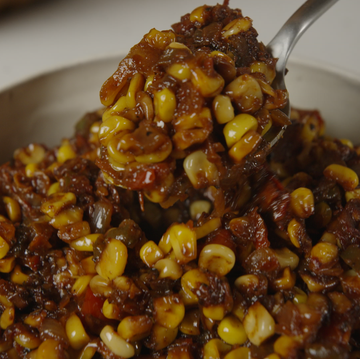As much as we love indulging in bacon at breakfast, it comes with a serious drawbacks. Your entire house will smell like bacon for days, you need to dodge hot beads of oil that pop out of the pan, and you’re always left with a pool of grease at the end.
We love repurposing bacon grease in recipes instead of using oil or butter (like our decadent potato galette). But leftover bacon grease usually gets discarded—a process that’s more complicated than it should be.
Dumping hot grease directly into the trash isn’t a great idea, especially if there are holes in your bag. Pouring it down the sink may seem like a cleaner, simpler solution. But it comes at a serious cost.
We talked to Dr. Rosemary Trout, food scientist and professor at Drexel University, to unpack the science surrounding grease and what happens when it’s poured down the drain.
Is Pouring Grease Down The Drain That Bad?
Yes. It is actually that bad.
Not only can grease harm the sewer system, but it can seriously wreck your pipes. Relying on the drain to dispose of grease may seem like the easy way out, but the long term consequences far outweigh any initial convenience.
"Grease solidifies as it cools, so when you dump it down your drain, you can end up with slippery solid masses that get stuck to pipes and can block the flow of water,” Trout says.
Trout says that triglycerides, another name for dietary fat, break down into fatty acids and glycerol. The former combines with the calcium in our water supply to form a deposit that resembles wax. "The waxy buildup accumulates on the top of the pipes causing waxy pillars that hang down and interfere with water flow,” she adds.
Clogged pipes aren’t just a nuisance; they can also be costly. If water encounters enough of a blockage, the water pressure can increase enough to burst your pipes. It creates a huge mess and comes with steep repair costs to fix the problem.
If that doesn’t happen in your own plumbing system, it ends up in public plumbing infrastructure. And the grease from multiple households can collect other forms of waste (like those so-called “flushable" wipes) and solidify into what is known as a fatberg.
A fatberg can balloon into a massive blockage, in some cases as large as three double-decker buses. They can flood our sewer systems, damage our infrastructure, and present serious public health risks.
So the next time you think of dumping your grease down the drain, you should definitely reconsider.
What’s The Best Way To Dispose Of Grease?
Even though you shouldn't use the sink to get rid of grease, there are still effective methods that you can use instead. When it comes to fat in a liquid state, you can use a paper towel to soak it up from a pan before throwing it away—but this technique works best when you're working with a smaller amount of grease.
Larger amounts of liquid fat can also be decanted into a disposable container with a lid, like a used water bottle, before going into the garbage. But there are some precautions you should consider. First, it's worth investing in a funnel to avoid any unwanted spills. And you should be careful if you're working with any hot fat because of the risk of burning yourself.
If you want to avoid any potential injuries, it's arguably easier to let your saturated fats (like bacon grease, lard, butter, or shortening) solidify before throwing them away. Simply pour it into a heatproof container while still hot, pop it in the fridge to solidify, then scrape it directly into the trash.














